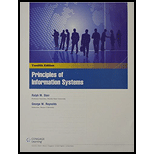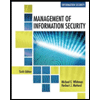
PRINCIPLES OF INFO.SYS.(LL)>CUSTOM PKG<
12th Edition
ISBN: 9781337074674
Author: STAIR
Publisher: CENGAGE C
expand_more
expand_more
format_list_bulleted
Question
Chapter 1, Problem 1DQ1
Program Plan Intro
- An information system is a system which provides the necessary information to an organization to achieve the goals.
- It monitors the transactions details, provides the required information to decision makers, and provides necessary documents to the customers.
- The main components in the information system are people, data, procedures, hardware, and software.
- The main function of information system is to accept and process the input data and then stores the retrieved information and distributes it across the organization.
Expert Solution & Answer
Want to see the full answer?
Check out a sample textbook solution
Students have asked these similar questions
• Solve the problem (pls refer to the inserted image) and create line graph.
who started the world wide web
Question No 1:
(Topic: Systems for collaboration and social business The information systems function in business)
How does Porter's competitive forces model help companies develop competitive strategies using information systems?
• List and describe four competitive strategies enabled by information systems that firms can pursue.
• Describe how information systems can support each of these competitive strategies and give examples.
Chapter 1 Solutions
PRINCIPLES OF INFO.SYS.(LL)>CUSTOM PKG<
Ch. 1.6 - Prob. 1DQCh. 1.6 - Prob. 2DQCh. 1.6 - Prob. 1CTQCh. 1.6 - Prob. 2CTQCh. 1.9 - Prob. 1DQCh. 1.9 - Prob. 2DQCh. 1.9 - Prob. 1CTQCh. 1.9 - Prob. 2CTQCh. 1 - Prob. 1SATCh. 1 - Prob. 2SAT
Ch. 1 - Prob. 3SATCh. 1 - Prob. 4SATCh. 1 - Prob. 5SATCh. 1 - Prob. 6SATCh. 1 - Prob. 7SATCh. 1 - Prob. 8SATCh. 1 - Prob. 9SATCh. 1 - Prob. 10SATCh. 1 - Prob. 11SATCh. 1 - Prob. 12SATCh. 1 - Prob. 13SATCh. 1 - During the _____________ step of the systems...Ch. 1 - Prob. 15SATCh. 1 - Prob. 1RQCh. 1 - Prob. 2RQCh. 1 - Prob. 3RQCh. 1 - Prob. 4RQCh. 1 - Prob. 5RQCh. 1 - Prob. 6RQCh. 1 - Prob. 7RQCh. 1 - Prob. 8RQCh. 1 - Prob. 9RQCh. 1 - Prob. 10RQCh. 1 - Prob. 11RQCh. 1 - Prob. 12RQCh. 1 - Prob. 13RQCh. 1 - Prob. 14RQCh. 1 - Prob. 15RQCh. 1 - Prob. 1DQCh. 1 - Prob. 2DQCh. 1 - What are the two basic types of software? Give...Ch. 1 - Prob. 4DQCh. 1 - Prob. 5DQCh. 1 - Prob. 6DQCh. 1 - Prob. 7DQCh. 1 - Prob. 8DQCh. 1 - Prob. 9DQCh. 1 - Prob. 10DQCh. 1 - Prob. 2PSECh. 1 - Prob. 3PSECh. 1 - Prob. 4PSECh. 1 - Prob. 2TACh. 1 - Prob. 1WECh. 1 - Prob. 2WECh. 1 - Prob. 3WECh. 1 - Prob. 1CECh. 1 - Prob. 2CECh. 1 - Prob. 1DQ1Ch. 1 - Prob. 2DQ1Ch. 1 - Prob. 1CTQ1Ch. 1 - Prob. 2CTQ1Ch. 1 - Prob. 1DQ2Ch. 1 - Prob. 2DQ2Ch. 1 - Prob. 1CTQ2Ch. 1 - Prob. 2CTQ2Ch. 1 - Prob. 1DQ3Ch. 1 - Prob. 2DQ3Ch. 1 - Prob. 1CTQ3Ch. 1 - Prob. 2CTQ3
Knowledge Booster
Similar questions
- Data communıcatıon digital data is transmitted via analog ASK and PSK are used together to increase the number of bits transmitted a)For m=8,suggest a solution and define signal elements , and then draw signals for the following sent data data = 0 1 0 1 1 0 0 0 1 0 1 1arrow_forwardDatacommunicationData = 1 1 0 0 1 0 0 1 0 1 1 1 1 0 0a) how many bıts can be detected and corrected by this coding why prove?b)what wıll be the decision of the reciever if it recieve the following codewords why?arrow_forwardpattern recognitionPCA algor'thmarrow_forward
- Consider the following program: LOAD AC, IMMEDIATE(30) ADD AC, REGISTER(R1) STORE AC, MEMORY(20) Given that the value of R1 is 50, determine the value stored at memory address 20 after the program is executed. Provide an explanation to support your answer.arrow_forwardPattern RecognitonDecision Tree please write the steps not only last answerarrow_forwardPattern RecognitionPCA algorithmplease write the steps not only last answerarrow_forward
- Please original work Final Project: Part I Background Information: E-TechMart, established in 2005, has grown to become a leading global electronics retailer, renowned for its extensive range of electronic devices and accessories. With a robust online platform and numerous brick-and-mortar stores spread across various regions, E-TechMart serves millions of customers worldwide. The company's product offerings include the latest smartphones, laptops, tablets, smart home devices, and a variety of electronic accessories, catering to both individual consumers and businesses. E-TechMart has always prioritized customer satisfaction and aims to provide an exceptional shopping experience. This commitment is evident in their comprehensive customer service, competitive pricing, and a well-organized loyalty program that rewards repeat customers. Despite these strengths, E-TechMart faces increasing competition from other major players in the electronics retail market. To maintain its competitive…arrow_forwardCan you show me how to redesign the GameStop website using HTML and CSS using Sublime Text?arrow_forwardManhattan distancearrow_forward
- Aiwhat cost from Oradea to Goal which Eforie us A* Algorithm G(n)+H(n) last what ıs the costarrow_forwardWhat is the SELECT statement? give one reference with your answer What is a URL and what is it used for? give one reference with your answer What is e-mail, and what are its advantages? Give one reference with your answerarrow_forwardWhat is the difference between the World Wide Web (WWW) and the Internet? Give two references from a journal along with your answer.arrow_forward
arrow_back_ios
SEE MORE QUESTIONS
arrow_forward_ios
Recommended textbooks for you
 Principles of Information Systems (MindTap Course...Computer ScienceISBN:9781285867168Author:Ralph Stair, George ReynoldsPublisher:Cengage Learning
Principles of Information Systems (MindTap Course...Computer ScienceISBN:9781285867168Author:Ralph Stair, George ReynoldsPublisher:Cengage Learning Fundamentals of Information SystemsComputer ScienceISBN:9781305082168Author:Ralph Stair, George ReynoldsPublisher:Cengage Learning
Fundamentals of Information SystemsComputer ScienceISBN:9781305082168Author:Ralph Stair, George ReynoldsPublisher:Cengage Learning Principles of Information Systems (MindTap Course...Computer ScienceISBN:9781305971776Author:Ralph Stair, George ReynoldsPublisher:Cengage Learning
Principles of Information Systems (MindTap Course...Computer ScienceISBN:9781305971776Author:Ralph Stair, George ReynoldsPublisher:Cengage Learning Management Of Information SecurityComputer ScienceISBN:9781337405713Author:WHITMAN, Michael.Publisher:Cengage Learning,
Management Of Information SecurityComputer ScienceISBN:9781337405713Author:WHITMAN, Michael.Publisher:Cengage Learning, Information Technology Project ManagementComputer ScienceISBN:9781337101356Author:Kathy SchwalbePublisher:Cengage Learning
Information Technology Project ManagementComputer ScienceISBN:9781337101356Author:Kathy SchwalbePublisher:Cengage Learning Fundamentals of Information SystemsComputer ScienceISBN:9781337097536Author:Ralph Stair, George ReynoldsPublisher:Cengage Learning
Fundamentals of Information SystemsComputer ScienceISBN:9781337097536Author:Ralph Stair, George ReynoldsPublisher:Cengage Learning

Principles of Information Systems (MindTap Course...
Computer Science
ISBN:9781285867168
Author:Ralph Stair, George Reynolds
Publisher:Cengage Learning

Fundamentals of Information Systems
Computer Science
ISBN:9781305082168
Author:Ralph Stair, George Reynolds
Publisher:Cengage Learning

Principles of Information Systems (MindTap Course...
Computer Science
ISBN:9781305971776
Author:Ralph Stair, George Reynolds
Publisher:Cengage Learning

Management Of Information Security
Computer Science
ISBN:9781337405713
Author:WHITMAN, Michael.
Publisher:Cengage Learning,

Information Technology Project Management
Computer Science
ISBN:9781337101356
Author:Kathy Schwalbe
Publisher:Cengage Learning

Fundamentals of Information Systems
Computer Science
ISBN:9781337097536
Author:Ralph Stair, George Reynolds
Publisher:Cengage Learning